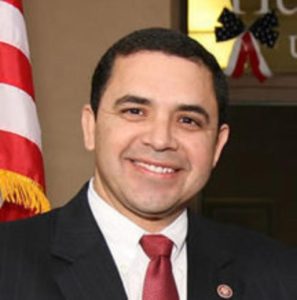Rep. Cuellar’s Statement on President Biden’s FY2022 Discretionary Funding Request
Written by Post Public Information Representative, Apr 10, 2021, 0 Comments
Courtesy Alexis Torres,
 Washington, D.C. – Congressman Henry Cuellar, a member of the powerful House Appropriations Committee, released the following statement on President Biden’s fiscal year 2022 discretionary funding request:
Washington, D.C. – Congressman Henry Cuellar, a member of the powerful House Appropriations Committee, released the following statement on President Biden’s fiscal year 2022 discretionary funding request:
“The coronavirus pandemic has exposed serious needs in Texas and across the country. President Biden’s funding request takes important steps to meet these needs and set our nation on a course for a better future,” said Congressman Cuellar. “The President’s budget request is the first phase of the appropriations process. In the coming months, I will work hard with my colleagues to review his request and create appropriations bills that fund the federal government. As a senior member of the House Appropriations Committee, I am committed to funding critical priorities that will make our country stronger, safer, healthier, and more secure.”
Among its many important proposals, President Biden’s budget blueprint invests in:
Make a Historic Investment in High-Poverty Schools. The discretionary request proposes a historic $36.5 billion investment in Title I grants, a $20 billion increase from the 2021 enacted level, to provide high-poverty schools with the funding they need to deliver a high-quality education to all of their students. This funding, the single largest year-over-year increase since the inception of the Title I program, will address long-standing funding disparities between under-resourced school districts and their wealthier counterparts, providing critical new support to both students and teachers.
Launch the Advanced Research Projects Agency for Health (ARPA-H). The discretionary request calls for $6.5 billion to launch the Advanced Research Projects Agency for Health (ARPA-H) within the National Institutes of Health (NIH). With an initial focus on cancer and other diseases such as diabetes and Alzheimer’s, this major investment in federal research and development will drive transformational innovation in health research and speed application and implementation of health breakthroughs.
Help End the Opioid Epidemic. The opioid epidemic has shattered families, claimed lives, and ravaged communities across the country — and the COVID-19 pandemic has only deepened this crisis. The discretionary request includes a historic investment of $10.7 billion, an increase of $3.9 billion over the 2021 enacted level, to support research, prevention, treatment, and recovery support services, with targeted investments to support populations with unique needs, including Native Americans, older Americans, and rural populations.
Improve Readiness for Future Public Health Crises. The discretionary request includes $8.7 billion for the Centers for Disease Control and Prevention (CDC) — the largest budget authority increase in nearly two decades — to restore capacity at the world’s preeminent public health agency. Building on the investments in the American Rescue Plan, CDC will use this additional funding to support core public health capacity improvements in States and Territories, modernize public health data collection nationwide, train new epidemiologists and other public health experts, and build international capacity to detect, prepare for, and respond to emerging global threats.
Extend Housing Vouchers and Help End Homelessness. The discretionary request proposes to provide $30.4 billion for Housing Choice Vouchers, expanding vital assistance to 200,000 more families, with a focus on those who are homeless or fleeing domestic violence. It also builds on provisions in the American Rescue Plan by providing a $500 million increase for Homeless Assistance Grants to support more than 100,000 additional households, helping prevent and reduce homelessness.
Address the Root Causes of Migration from Central America and Reduce Asylum Backlogs. The request proposes $861 million as a first step towards a four- year commitment to invest in Central America as part of a comprehensive strategy to address the root causes of irregular migration. The request also proposes $345 million for the United States Citizenship and Immigration Services to adjudicate naturalization and asylum cases of those who have been waiting for years. And it increases the budget of the Executive Office for Immigration Review by 21 percent to $891 million to reduce court backlogs through 100 new immigration judges and support teams.
Since 2011, austere budget caps imposed by the Budget Control Act have limited the amount of funding that Congress can provide for critical needs. With the budget caps expiring this year, Congress can finally provide long overdue funding increases for important initiatives. As a member of the House Appropriations Committee, Congressman Cuellar will have a leading role in determining federal funding.



